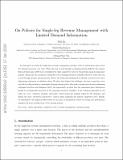| dc.contributor.author | Chen, Xi | |
| dc.contributor.author | Owen, Zachary | |
| dc.contributor.author | Pixton, Clark | |
| dc.contributor.author | Simchi-Levi, David | |
| dc.date.accessioned | 2021-10-25T14:11:24Z | |
| dc.date.available | 2021-10-25T14:11:24Z | |
| dc.date.issued | 2021-01 | |
| dc.date.submitted | 2019-05 | |
| dc.identifier.issn | 0025-1909 | |
| dc.identifier.issn | 1526-5501 | |
| dc.identifier.uri | https://hdl.handle.net/1721.1/133078 | |
| dc.description.abstract | We consider a logit model-based framework for modeling joint pricing and assortment decisions that take into account customer features. This model provides a significant advantage when one has insufficient data for any one customer and wishes to generalize learning about one customer’s preferences to the population. Under this model, we study the statistical learning task of model fitting from a static store of precollected customer data. This setting, in contrast to the popular learning and earning paradigm, represents the situation many business teams encounter in which their data collection abilities have outstripped their data analysis capabilities. In this learning setting, we establish finite-sample convergence guarantees on the model parameters. The parameter convergence guarantees are then extended to out-of-sample performance guarantees in terms of revenue, in the form of a high-probability bound on the gap between the expected revenue of the best action taken under the estimated parameters and the revenue generated by a decision maker with full knowledge of the choice model. We further discuss practical implications of these bounds. We demonstrate the personalization approach using ticket purchase data from an airline carrier. This paper was accepted by J. George Shanthikumar, special issue on data-driven prescriptive analytics | en_US |
| dc.language.iso | en | |
| dc.publisher | Institute for Operations Research and the Management Sciences (INFORMS) | en_US |
| dc.relation.isversionof | 10.1287/MNSC.2020.3772 | en_US |
| dc.rights | Creative Commons Attribution-Noncommercial-Share Alike | en_US |
| dc.rights.uri | http://creativecommons.org/licenses/by-nc-sa/4.0/ | en_US |
| dc.source | SSRN | en_US |
| dc.title | A Statistical Learning Approach to Personalization in Revenue Management | en_US |
| dc.type | Article | en_US |
| dc.identifier.citation | Xi Chen, Zachary Owen,, Clark Pixton, David Simchi-Levi (2021) A Statistical Learning Approach to Personalization in Revenue Management. Management Science 0(0). | en_US |
| dc.contributor.department | Massachusetts Institute of Technology. Institute for Data, Systems, and Society | |
| dc.contributor.department | Massachusetts Institute of Technology. Department of Civil and Environmental Engineering | |
| dc.contributor.department | Massachusetts Institute of Technology. Operations Research Center | |
| dc.relation.journal | Management Science | en_US |
| dc.eprint.version | Original manuscript | en_US |
| dc.type.uri | http://purl.org/eprint/type/JournalArticle | en_US |
| eprint.status | http://purl.org/eprint/status/NonPeerReviewed | en_US |
| dc.date.updated | 2021-10-21T17:09:16Z | |
| dspace.orderedauthors | Chen, X; Owen, Z; Pixton, C; Simchi-Levi, D | en_US |
| dspace.date.submission | 2021-10-21T17:09:18Z | |
| mit.license | OPEN_ACCESS_POLICY | |
| mit.metadata.status | Authority Work Needed | en_US |
